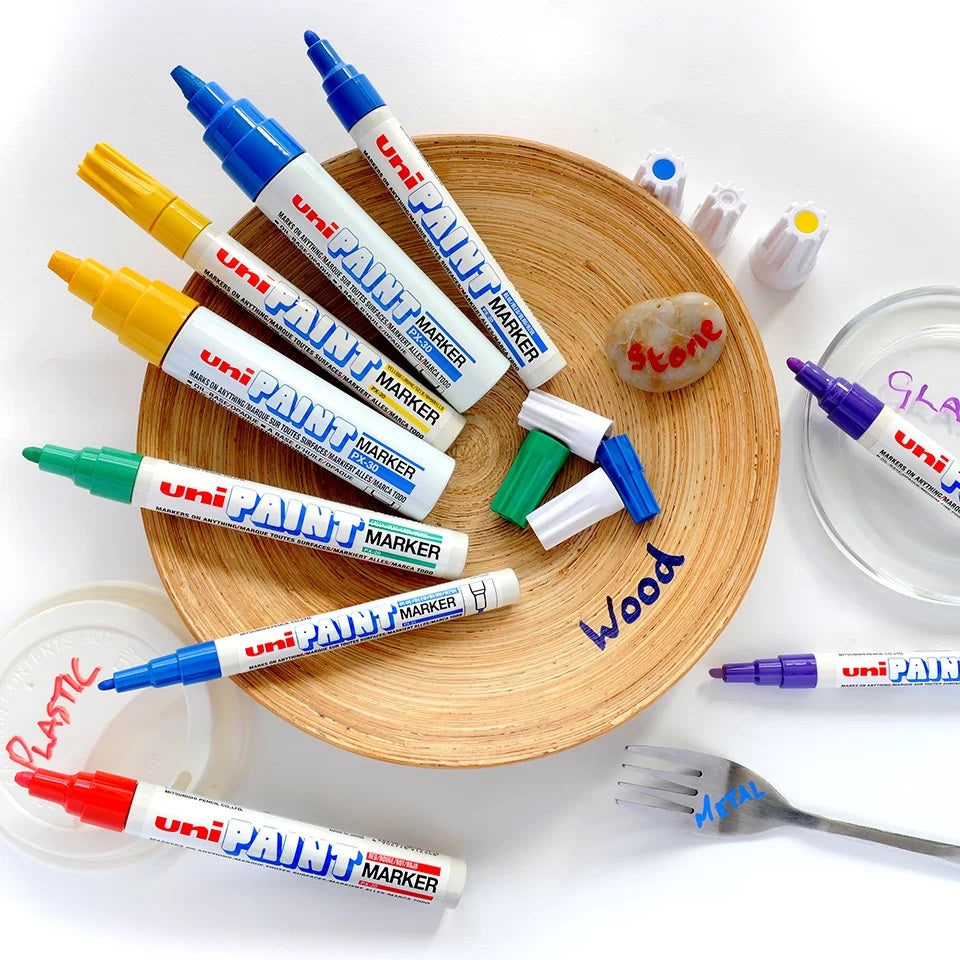In the world of art and creativity, new tools often spark exciting new possibilities. One such tool that has revolutionized the way artists, hobbyists, and DIY lovers create is the paint marker. These handy instruments combine the precision of a pen with the bold impact of paint—giving creators total control with vibrant results.
Whether you're working on a canvas, customizing sneakers, or adding details to a mixed-media project, paint markers are an essential tool in every artist’s toolkit. In this comprehensive guide, we'll dive deep into what paint markers are, how they work, how to use them, and why every artist should own a set.
🖊️ What Are Paint Markers?
Paint markers are pens that dispense paint instead of ink. Unlike traditional markers or pens, they contain pigmented paint—typically oil-based or water-based—which allows them to write or draw on a wide range of surfaces including:
-
Paper and canvas
-
Plastic and glass
-
Metal and wood
-
Stone and fabric
Because of their bold opacity and smooth application, paint markers are ideal for creating artwork that stands out. Artists love them for details, outlines, and customization projects.

🔍 How Do Paint Markers Work?
Paint markers use a press-and-pump mechanism to release paint from an internal reservoir. Once the paint flows to the tip, the artist can apply it just like a marker. Most high-quality paint markers are fade-resistant, waterproof, and quick-drying, making them suitable for indoor and outdoor artwork.
🧠 Benefits of Using Paint Markers
Here’s why artists around the world are turning to paint markers for their creative projects:
✅ 1. Precision Meets Vibrancy
Paint markers allow artists to add fine details with bold color, something traditional brushes can’t easily do.
✅ 2. No Brushes or Palettes Needed
Unlike regular paint, there’s no setup or cleanup. Just shake, press, and draw.
✅ 3. Works on Any Surface
Whether it’s a glass vase or a denim jacket, paint markers adhere smoothly to various surfaces.
✅ 4. Great for Customization
Perfect for personalizing mugs, skateboards, shoes, and even mobile cases.
🖌️ Types of Paint Markers
Understanding different types helps you choose the right tool for your project.
🟢 Water-Based Paint Markers
-
Easy to clean
-
Odorless and non-toxic
-
Great for paper, canvas, and indoor use
🔴 Oil-Based Paint Markers
-
Long-lasting and weather-resistant
-
Ideal for outdoor projects and surfaces like metal, glass, and ceramics
Each type is available in fine, medium, and broad tips—giving you full control over line thickness and fill areas.
✨ How to Use Paint Markers: Step-by-Step Guide
1. Shake the Marker Well
This ensures the pigment and liquid inside the marker are properly mixed.
2. Prime the Tip
Press the marker tip gently on scrap paper until the paint flows out evenly.
3. Start Drawing
Use light pressure and smooth strokes to apply the paint to your surface.
4. Let It Dry
Allow your artwork to dry completely before layering or handling. Dry time depends on the paint type and surface.
5. Recap Tightly
To prevent drying out, always replace the cap securely after use.
🖍️ Best Surfaces to Use Paint Markers On
-
Wood – Add patterns and words to wooden signs or crafts
-
Glass – Create DIY mugs or window designs
-
Stone – Decorate garden rocks or mandalas
-
Fabric – Personalize jackets, canvas shoes, or bags
-
Metal – Perfect for automotive or industrial art
🧑🎨 Ideal For All Types of Creators
Paint markers are not limited to professional artists. They’re ideal for:
-
Students – School projects, posters, and creative assignments
-
Crafters – DIY gifts, party decor, and handmade cards
-
Designers – Product mockups, presentations, and fashion design
-
Artists – Mixed media pieces, canvas work, and illustration
-
Calligraphers – Bold lettering, sign painting, and journaling
Whether you're starting your journey or refining your technique, paint markers offer a fun, mess-free way to express creativity.
🎨 Combine Paint Markers with Other Art Tools
To unlock their full potential, paint markers can be used with other artistic tools:
🖍️ Art Pencils & Colored Pencils
Use Faber Castell colored pencils for base shading, then outline or highlight with markers for contrast and depth.
✏️ Clutch Pencil Sets
The Faber Castell clutch pencil set gives you mechanical precision for drafting designs before committing with paint markers.
🎒 Artist Pencils
Sketch lightly with artist pencils, then add bold paint details over the drawing to create stunning visual contrast.
🛍️ Why Buy Paint Markers from Stationers.pk?
Stationers.pk is Pakistan’s go-to online store for high-quality art supplies. Here’s why artists across the country trust us:
-
✔️ 100% genuine brands like Faber Castell
-
✔️ Affordable pricing with seasonal discounts
-
✔️ Nationwide delivery with fast shipping
-
✔️ Excellent customer support for bulk orders
-
✔️ Wide range of art pencils, markers, and craft tools
📚 Educational Projects Using Paint Markers
Looking for inspiration? Try these beginner-friendly project ideas:
1. Painted Rocks
Draw mandalas or inspirational words on smooth stones for gifts or decoration.
2. Custom Phone Covers
Design one-of-a-kind phone cases using your favorite paint marker colors.
3. Tote Bag Designs
Use paint markers on canvas tote bags for fun, eco-friendly fashion.
4. Calligraphy Practice
Master brush lettering with water-based paint markers on cardstock.
5. Decorative Plant Pots
Paint faces, quotes, or patterns on ceramic or clay pots for a unique home touch.
📌 Featured Snippet Optimized Q&A Section
🖊️ What are paint markers used for?
Paint markers are used to apply opaque, pigmented paint on various surfaces such as paper, glass, wood, fabric, metal, and plastic. They're ideal for crafts, customization, and mixed-media artwork.
🖊️ Can paint markers be used on fabric?
Yes, especially oil-based paint markers are great for permanent designs on fabric. Just allow the paint to dry fully and heat-set if needed.
🖊️ What’s the difference between paint markers and regular markers?
Regular markers use ink, while paint markers contain actual paint, offering better opacity, vibrant color, and surface versatility.

